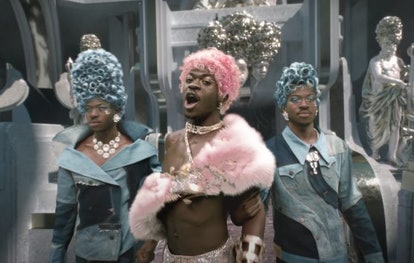Lil Nas X recently released his “Montero (Call Me By Your Name)” music video and instantly the internet exploded with, “This person is making our children gay! Hide your very straight kids who will see A Gay.” For so many reasons, I have questions.
Some of the concern behind this music video in particular apparently stems from the belief that there is a “machine” that wants your kids to “turn gay.” And while it goes without saying that no devout heterosexual can “turn gay” simply by seeing a music video, I can tell you if we have any “system” at all, that system wants to “turn you” straight.
Lil Nas X, previously known to many parents as the person who sang kid-favorite “Old Town Road,” acknowledges this system in the music video. He begins with a voiceover about how we are asked to hide the parts of ourselves that we don’t want the world to see, and introducing the idea of a world called Montero, where we don’t have to hide the true parts of ourselves. I think if you asked the average parent which kind of world they want to see — one wherein their kids are allowed to be who they want to be, or one wherein they’re forced to become something they are not — they would unanimously favor the latter.
Unless, of course “being who they’re allowed to be” means they are LGBTQ.
The truth that so many of these Very Concerned Parents are ignoring is that heteronormative culture actively encourages kids to “turn straight.” It dictates what someone’s assigned gender means, and how they should act because of that, and which gender they can love. From birth, many of us will only see stories of heterosexual couples being told on screen, and notably many of the queer characters we will see will die tragic deaths, or one of them dies, perpetuating the message: “Be careful kids, being queer has consequences!” The happy endings, the acceptance, the happiness, often belongs solely to kids who go down the path society really wants you to go down: heterosexuality.
When you have kids, you’re supposed to have them with the idea that you have no idea who this person is meant to be.
The idea that you can be worried that kids can “turn gay” simply from seeing openly queer performers not only doesn’t make any sense — How does someone turn gay? Are they removed from the lumber yard at Home Depot and, as though in a trance, they turn to kiss someone in the Garden Center? — it also speaks 100% to the base issue that you don’t like queer people.
When you have kids, you’re supposed to have them with the idea that you have no idea who this person is meant to be. Yes, you bring them into the world, but kids come into the world, even as babies, with their own personalities, their own things that make them unique and special. If your child is born queer, and sees a queer performer, that can only, and will only, open up an entire world of possibility for them. However, if your child is born queer, and sees only heterosexual performers and icons, and is told those are the only appropriate figures to view in the world, that child will feel immense shame that will negatively impact them for as long as they hold onto it. It is actively damaging.
People talk about seeing queer figures in media as though they’re cigarettes: something unhealthy and bad and wrong, and seeing them look cool means your kids will get evil gay cancer by trying them. This is incorrect, and says so much more about someone’s view of LGBTQ people than it does about a system they made up.
Queer people are not cigarettes. They are not meth. And the fact is, if you’re really worried about your kids suddenly becoming something other than who they really are, due to media influence, I’d ask you to acknowledge that it’s already doing that. So many queer people I know, myself included, never saw themselves fully in media, and even now, only very rarely even though the strides made have been wonderful.
The only thing the increased visibility of queer artists like Lil Nas X will do is show your child that if they are queer, it is beautiful, and it is acceptable, which he has repeatedly done in his response to criticism. And if there’s one thing every parent should want for their child, it’s for them to know they are beautiful and worthy no matter who they are.

